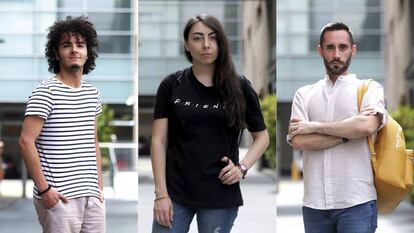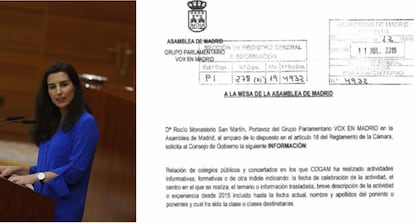Madrid LGBT activists: “We teach the workshops that Vox wants to ban”
Volunteers speak out after the far-right party requests the names of people who work to raise awareness of the communities at public schools in the region

“Ms Monasterio, we teach the workshops that you want to ban.”
Miguel, María and Sergio are LGBT activists who do volunteer work for Cogam, a Madrid association, and for the Triángulo Foundation. Both groups organize LGBT-phobia awareness workshops at Madrid high schools.
Their words are aimed at Rocío Monasterio, a regional leader of Vox, the far-right party that first entered parliamentary institutions in December 2018 and has since made gains at local, regional and general elections held in April and May of this year.
We are giving oxygen to young people going through a difficult period
Sergio Val, volunteer
On July 9, Vox requested information from the Madrid regional assembly regarding LGBT workshops held by Cogam at public or regionally funded schools. The move is in line with similar petitions filed in the regions of Valencia and Andalusia (where the right-of-center Popular Party and Ciudadanos head a joint government with Vox’s support).
“Vox is particularly obsessed with this community,” says Carla Antonelli, a Socialist Party (PSOE) deputy who shared information about the Madrid request on Twitter. “This is an inquisition, a witch hunt against the LGBT community.”
In Andalusia, the far right has asked for an end to public funding for pro-LGBT groups because these, they say, offer “a sectarian, confrontational vision of reality” and “are not socially useful.”

Growing audience
“At first we reached out to 3,000 students, and this year we’ve had in excess of 10,000 beneficiaries, including parents and educators,” explains Sara Guilló Sáez, 33, a social psychologist and head of education issues at Cogam.
“Vox has asked for the names of people who are teaching these courses, so here we are to tell [Vox’s Madrid leader Rocío Monasterio] that she is welcome to come around at any time, to learn what our workshops are all about.”
Their decision to go public is a result of the far-right party’s request, made inside the Madrid regional assembly, to obtain a “list of public and publicly funded private schools where Cogam has carried out activities from 2015 to today, indicating the date of the activity, the school, a short description of the activity, the names of the lecturers, and which classes have taken part in the activities.”
Miguel Calvo Pérez, 25, has been working as an education program technician at Triángulo Foundation for the last two years. One of his tasks is to conduct workshops at elementary and secondary schools to “create awareness about the community and prevent LGBT-phobic reactions.”
We discuss stereotypes and prejudice, and how this can lead to discrimination and harassment
Miguel Calvo Pérez
When Calvo goes to a school, the first thing he does is meet with the principal and other school managers. “The teacher in charge of the class talks a little about the students, and then we are introduced,” he explains. “We start by clarifying some concepts, like the difference between gender identity, sexual orientation and gender roles. We also discuss stereotypes and prejudice, and how this can lead to discrimination and harassment.”
“Both Vox and Ciudadanos have got us in their sights,” says Carmen García de Merlo, the president of Cogam. Last Friday, her association asked Madrid prosecutors to act against Vox for “political persecution” against the LGBT community. A few political parties, such as the PSOE, Podemos and United Left (IU), have also announced that they plan to file complaints.
“Underlying these attacks there is a far-right ideology that clashes with human rights, with the law and with the Spanish Constitution,” says Guilló, speaking from a conference in Italy. “Cogam is an international reference point.”
These volunteers note that it is not easy to collect data about any hypothetical increase in harassment at education centers. “It’s more visible now,” says Calvo. “Ten or 15 years ago, the violence was more physical. Now it is more psychological, or it is exercised through social media.”
Ten or 15 years ago, the violence was more physical. Now it is more psychological, or it is exercised through social media
Miguel Calvo, volunteer
Sometimes, he says, a student will come to him at the end of his talk to confide that he or she has witnessed such situations, either at home or elsewhere. “It’s a one-hour talk that we hope will plant a seed to make them think about the way they treat others,” explains Calvo.
These workshops are aimed at different audiences: sometimes kids of varying ages, sometimes teachers or parents. “With primary school students we talk about family diversity; with secondary students we focus on sexual orientation and gender roles,” says Sergio Val, 35, who spent six years going to Madrid high schools for Cogam. “They needed volunteers, and I decided it wasn’t enough to just attend Gay Pride once a year. I wanted to be an activist.”
What stands out from these years of experience is “the possibility of helping someone when they need it.”
“Sometimes, after the workshop, a boy or girl would come over and tell me they were gay or lesbian, but didn’t know how to tell their friends and parents. That’s when you realize how important these workshops are,” he says. “We are giving oxygen to young people going through a difficult period.”
One of the things that motivates Val is his own experience as a teenage student. “When I discovered my homosexuality, I would have appreciated such a workshop myself.”
English version by Susana Urra.
Tu suscripción se está usando en otro dispositivo
¿Quieres añadir otro usuario a tu suscripción?
Si continúas leyendo en este dispositivo, no se podrá leer en el otro.
FlechaTu suscripción se está usando en otro dispositivo y solo puedes acceder a EL PAÍS desde un dispositivo a la vez.
Si quieres compartir tu cuenta, cambia tu suscripción a la modalidad Premium, así podrás añadir otro usuario. Cada uno accederá con su propia cuenta de email, lo que os permitirá personalizar vuestra experiencia en EL PAÍS.
¿Tienes una suscripción de empresa? Accede aquí para contratar más cuentas.
En el caso de no saber quién está usando tu cuenta, te recomendamos cambiar tu contraseña aquí.
Si decides continuar compartiendo tu cuenta, este mensaje se mostrará en tu dispositivo y en el de la otra persona que está usando tu cuenta de forma indefinida, afectando a tu experiencia de lectura. Puedes consultar aquí los términos y condiciones de la suscripción digital.








































